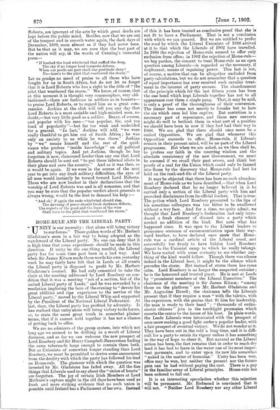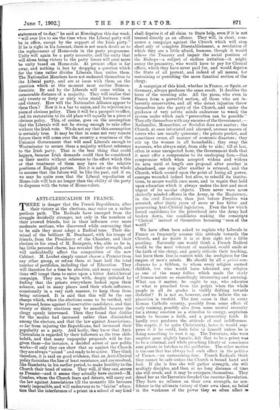HOME-RULE AND THE LIBERAL PARTY.
" UNITY is our necessity ; that alone will bring victory to our forces." These golden words of Mr. Herbert Gladstone's seem in a fair way to being adopted as the watchword of the Liberal party. No one can deny that it is high time that some experiment should be made in this direction. If unity be the one thing needful, the Liberal party has for some time past been in a bad way. And when Sir James Kitson made these words his own yesterday week he may fairly have felt that in Leeds at all events the Liberal party is disposed to profit by Mr. Herbert Gladstone's counsel. He had only consented to take the chair at the meeting addressed by Lord Rosebery on con- dition that it was a meeting " not of a section, but of the united Liberal party of Leeds," and he was rewarded by a resolution imploring the hero of the evening to " devote his great abilities and ripe experience to the service of the Liberal party," moved by the Liberal Whip and supported by the Prpsident of the National Liberal Federation. At last, then, the Liberal party has profited by adversity. It has realised that unity alone will bring victory to its forces, or, to state the same great truth in somewhat plainer terms, that if it cannot hold together it has not a chance of getting back to office.
We are no admirers of the group system, into which not long ago we seemed to be drifting as a result of Liberal disunion, and so far we can welcome the new prospect of Lord Rosebery and Sir Henry Campbell-Bannerman finding the same tabernacle large enough to contain them both. But as Unionists of somewhat longer standing than Lord Rosebery, we must be permitted to derive some amusement from the docility with which the party has followed his lead on Home-rule. The glamour with which the question was invested by Mr. Gladstone has faded away. All the fine things that Liberals used to say about the " union of hearts" are forgotten. The joy of certain Irish Members at Lord Methuen's capture might in the old days have been used as fresh and more striking evidence that no such union is possible until Ireland has a Parliament of her own. Instead of this it has been treated as conclusive proof that she is not fit to have a Parliament. That is not a conclusion with which we can quarrel. But we are entitled to prefer the road by which the Liberal Unionists of 1886 arrived at it to that which the Liberals of 1902 have travelled. In 1886 the rejection of Home-rule seemed to offer only exclusion from office; in 1902 the rejection of Home-rule- we beg pardon, the consent to treat Home-rule as an open question among Liberals—is regarded as the necessary, if unpleasant, means of regaining power. This last is not, of course, a motive that can be altogether excluded from party calculations, but we do not remember that a question of equal importance has ever received such cavalier treat- ment in the interest of party success. The abandonment of the principle which for the last fifteen years has been the one bond which kept Liberals together has not to all appearance cost them a single pang. That, it may be said, is only a proof of the thoroughness of their conversion. The sinner has come not merely to forsake but to hate the sin which once led him captive. But contrition is a.
necessary part of repentance, and these new converts might do well to bethink them in what sort of a position we should have been in now if they had had their way in 1886. We are glad that there should once more be a united Opposition. We are glad that whenever this Opposition succeeds to office, Home-rule, if Liberals remain in their present mind, will be no part of the Liberal programme. But when we are asked, as we then shall be, to profess our faith in the unerring wisdom and the absolute consistency of the new Government, we must be excused if we recall their past errors, and think but poorly of a zeal for the Union which could only be fanned into flame by the discovery that Home-rule had lost its hold on the rank-and-file of the Liberal party.
It may be objected that there has been no such abandon- ment of Home-rule as we have described,—that when Lord Rosebery declared that he no longer believed in it he carried only a section of the Liberal party with him and provoked disclaimers from its official leaders. That is true. The potion which Lord Rosebery presented to the lips of his sometime colleagues was too bitter to be swallowed without a wry face. And for a time, we quite admit, we thought that Lord Rosebery's declaration had only intro- duced a fresh element of discord into a party which needed no addition of the kind. But note what has happened since. It was open to the Liberal leaders to pronounce sentence of excommunication upon their way- ward brother, to have declared once more that Home- rule was a cardinal article of the Liberal creed, and sorrowfully but firmly to have bidden Lord Rosebery depart to the Unionist camp to which he really belongs. We have waited with some curiosity to see whether any- thing of the kind would follow. Though there was silence indeed in the Liberal host, it might be the silence which precedes the storm. But instead of storm there has come calm. Lord Rosebery is no longer the suspected outsider ; he is the honoured and trusted guest. He is met at Leeds by " prominent members of the Liberal Executive." The chairman of the meeting is Sir James Kitson ; " among those on the platform " are Mr. Herbert Gladstone and Mr. Augustine Birrell ; the chairman tells the Liberals present that if they require a man " with the talents, with the experience, with the genius that fit him for leadership, the man is ready to their hand " ; " thousands of enthu- siastic citizens " join in the torchlight procession which escorts the orator to the house of his host. In plain words, the Leeds Liberals were intoxicated with the prospect of once more making a good fight under a popular leader, with a fair prospect of eventual victory. We do not wonder at it. They have been out in the cold a, long time, and it is diffi- cult for a party to retain its vigour unless it has something in the way of hope to cheer it. But natural as the Liberal action has been, the fact remains that in order to reach dry land it has had to leave in the water one of its most impor- tant garments, and to enter upon its new life somewhat " naked in the matter of formulae." Unity has been won, office may be won, but neither the present nor the future gain can be had without paying the cost. There is a gap in the familiar array of Liberal principles. Home-rule has been ordered to fall out.
It is an interesting speculation whether this rejection will be permanent. Mr. Redmond is convinced that it will not. " Neither Lord Rosebery nor any other Liberal statesman of to-day," he said at Kensington this day week, " will ever live to see the time when the Liberal party will be in office, except by the support of the Irish party." If he is right in his forecast, there is not much doubt as to the replacement of Home-rule in the party programme. Unity will again be a party necessity, and the unity that will alone bring victory to the party forces will once more be unity based on Home-rule. At present office is far away, and nothing is lost by dropping a question which for the time rather divides Liberals than unites them. The Nationalist Members have not endeared themselves to the Liberal party, and are at issue with them on the question which at this moment most excites Noncon- formists. By and by the Liberals will come within a measurable distance of a majority. They will realise that only twenty or forty or sixty votes stand between them and victory. How will the Nationalist Alliance appear to them then ? Now it is a bar to union, and its rejection is a piece of obvious policy. Then it will be a passport to office, and its restoration to its old place will equally be a piece of obvious policy. This, of course, goes on the assumption that the Liberals will not be strong enough to take office without the Irish vote. We do not say that this assumption is certainly true. It may be that in some not very remote future there will come over the country a weariness of the Unionist Government that will send Liberals enough to Westminster to secure them a majority without reference to the Irish party. That is the best thing that could happen, because Irish demands could then be considered on their merits without reference to the effect which this or that treatment of them may have on the relative positions of English parties. But it is safer on the whole to assume that the future will be like the past, and if so, we may be quite sure that the Liberal repudiation of Home-rule will last no longer than the ability of the party to dispense with the votes of Home-rulers.







































 Previous page
Previous page